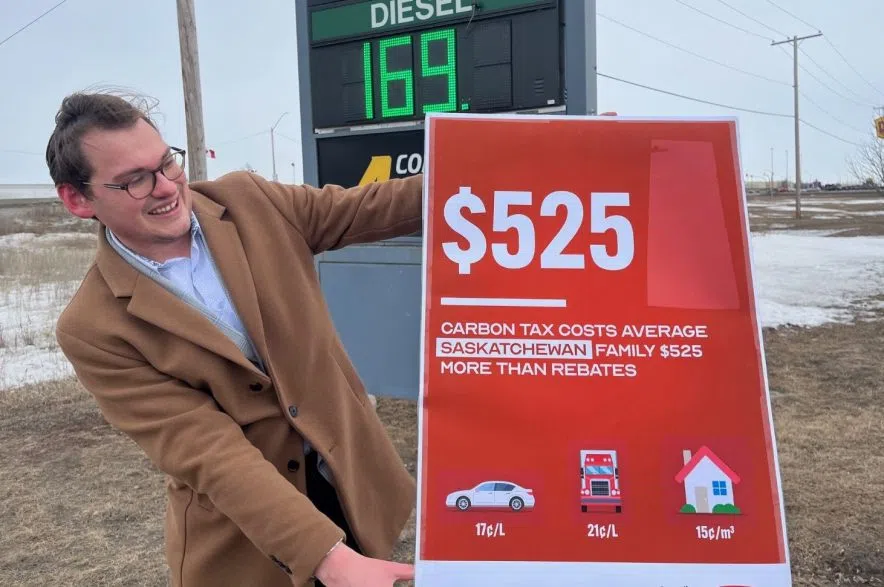Saskatchewan drivers will have to brace themselves for a jump at the pump as the federal carbon tax rises 23 per cent on Monday.
The increase in the carbon tax will hike the price of gas by three cents per litre, the price of diesel by four cents per litre, and the cost of natural gas by three cents per cubic metre, according to the Canadian Taxpayers Federation.
“After this April 1 hike, every single time you fill up a sedan, you’re going to be paying over $10 in just carbon tax,” said Gage Haubrich, the prairie director for the organization.
Haubrich said by 2030, the carbon tax will equate to 37 cents per litre on every litre of gasoline. That total currently is 17 cents per litre.
“When you go to the pump and you’re paying that carbon tax on your gas, you’re also paying GST on top of that carbon tax,” he noted.
It won’t be just pain at the pumps, as Haubrich said the tax will affect other prices down the country’s supply line.
“If you tax the farmer that makes the food, if you tax the trucker that transfers the food, and then tax the grocery store owner for keeping that food fresh, it’s no wonder that grocery prices are so high,” he said.
Haubrich noted that according to the Parliamentary Budget Officer, overall this year, the average Saskatchewan family will be paying $525 more a year than it receives in carbon tax rebates. He added that by 2030, that number will be $1,700.
The Canadian Taxpayers Federation is now raising the alarm, and calling on Prime Minister Justin Trudeau to scrap the tax.
“Saskatchewanians are tapped out and need relief,” Haubrich said.
According to a Leger poll from the Canadian Taxpayers Federation, 76 per cent of Saskatchewan and Manitoba participants oppose the tax.
Moe also calls to scrap the tax
Saskatchewan Premier Scott Moe has been pushing back on the scheduled increase to the federal carbon tax, along with most of Canada’s premiers and federal Conservatives.
The Saskatchewan government has backed its position on the carbon tax by removing it from home heating and not remitting that money to Ottawa.
The province made the decision to stop collecting the carbon tax from residents after the federal government announced it would remove the tax on home heating oil, which is used by many families in Atlantic Canada.
The federal government responded by saying Saskatchewan residents will not receive rebates, even if they’re paying the tax on other items.
Moe told The Evan Bray Show on Thursday that the measures taken by the province only mirror previous decisions made by the federal government that mainly impact the Maritimes.
He explained the policy on the carbon tax should be fair for all Canadians, and the tax should be postponed on all forms of heating such as electricity, propane and natural gas.
Moe said the clock is ticking, and Canadians will make the final decision on the policy in the 2025 federal election.
Trudeau has said Conservative politicians and premiers across Canada are lying to Canadians about the carbon price.
“Eight out of 10 families across the country in federal backstop jurisdictions make more money with the Canada Carbon Rebate than it costs with the price on pollution,” Trudeau said.
Jonathan Wilkinson, the federal minister of energy and natural resources, reiterated those numbers on the Evan Bray Show on Thursday, adding he recognizes people in Saskatchewan have questioned the consumer carbon price.
“It’s very clear the carbon price is actually the least-costly way to reduce emissions if people believe in the science of climate change,” he said, adding it’s an incentive for people to make different choices such as the model of car they use.
He added the federal government is helping provinces like Saskatchewan with its nuclear energy initiatives, noting the government’s offer of up to $74 million in funding to support small modular reactor development in the province.
— With files from The Canadian Press











